Day Three in Borneo
***
The first thing I see when I wake is a monkey.
It’s a long-tailed makak, the same kind of monkey that snuck into our klotok and stole bread the day before. He stands maybe forty centimeters tall, with his tail sticking up in the air as he walks.
He’s headed for the open door of our hotel room.
We’ve spent the night at the Rimba Eco-Lodge, the only accommodation available on the Sekonyer River. We have deluxe rooms- they not only have mosquito nets, but the beds themselves are spring mattresses, not foam; and the showers are hot. Cold showers and foam mattresses are much cheaper, but even then it’s twice the price of the hotel we’ve been staying at in Pangkalan Bun- without the ambiance of sleeping on board the boat.
I’ve come outside for a quick cigarette, to take in the early morning sunshine before we’re back on the river. The makak must have heard me open the door, because he appears almost immediately, on the roof of the rooms opposite ours.
“Erin!” I call out to my travel companion, my room-mate for the last few days, “Come and look at this!!”
“Oh wow!!” Erin is American, living in Oman. Her accent is awesome.
The makak leaps from one roof to another, then shimmies down the pole on the corner of the deck we’re standing on. I realise what he’s coming for, and slam the door shut just before he arrives. He sits on the chair directly outside the window and paws at it, aggravated that we’ve foiled his plans for an early morning snack and a rummage through our luggage.
The monkey gives us a slightly disgusted look, pivots and runs off. Back into the jungle, where he came from.
***
Today, we plant trees.
It’s part of a forest regeneration program, replanting native trees in an area devastated by fire just a few years earlier. We can choose what we wish to plant. There’s ironwood, slow growing but momentously strong, and sandalwood, harvested to make perfume. There are trees that support the orangutans, who can eat their fruit, leaves, bark and seeds. Trees that provide natural medicine, their roots boiled and the liquid drunk to ease the ache and shiver of malarial fever.
There’s a whole medicinal garden here, in fact- the Dayak people of Borneo knew their jungle plants, and the ailments they cured; and that knowledge, while perhaps distilled, has not been lost as time passes. I stare at the plaques hammered into the ground on wooden stakes, fascinated- there is so much potential here. Plants to treat itch, infection, conjunctivitis and sore throats. So many uses, so many cures. So many medicines that could be explored.
It’s blisteringly hot today, none of the cooling rain of yesterday. I’ve soaked a sarong and my hat in river water, but they’re both almost dry by the time we walk the one kilometre of rotting, lichen-ed jungle boardwalk to the planting station. When not under the shaded, dappled canopy of the jungle, the sun beats down with unimaginable force. It’s too hot, even for me, who’s been basking in the thirty five degree weather.
The ranger at the planting station lives alone in a tiny hut with only a rambling litter of Bornean short-tailed kittens for company. He’s lovely, helping us choose trees and selling us bracelets woven of from palm fronds. We pay 50 000 rupiah- about five dollars- for each tree we plant, and we sign the guest book on his front porch. It’s sad to see the last date written in was two weeks ago. There aren’t a lot of tourists here- we’ve seen eight, maybe nine other white folks during the river trek and orang feedings- but it’s evident that not a whole lot of them come for tree-planting.
It should be compulsory, says Erin, and I have to agree. Planting the tree itself is merely symbolic- it’s the money we pay to do it that’s important, funding the rehabilitation of the jungle.
I choose a sandalwood for me, because it’s one of my favorite fragrances- it’s a perfume my mum used to wear.
Then I select and ironwood. For someone that I used to know. Because he’ll never be here, in this place so far away from where we existed.
It feels like tying off a thread.
Ironwood is used for building- boats and houses, wharf and sheds. They grow slowly, just one centimeter a year.
I whisper a tiny prayer as I pack the dirt around the sapling’s roots.
There might be tears on my cheeks. Or it might just be the endless, dripping sweat; a product of standing too long underneath the hot Indonesian sun.
***
There are three feeding stations for orangutans in Tajung Puting National Park. They serve to subsidise the foraging efforts of the orangs, whose natural food sources are rapidly disappearing. The orangs at Camp Leakey, the third feeding station, are accustomed to humans- Dr Gildakris lived in close proximity to them for years, and they are comfortable around people.
The orangutans at the first and second stations are not so used to having people in their space, and that’s apparent in the way they move. They are quicker, less trusting, keep their distance more.
They’re amazingly beautiful.
A huge male sits outside the roped-off area where the platform is, drinking milk from a bucket. He leans down and puts his whole head inside it, and we can hear the slurping, smacking sounds as he drinks. He splits tiny bananas sideways, chews messily and swallows. He has massive cheek pads jutting out from each side of his face. Ivend tells us that he used to be the alpha-male of this station, but now, following a fight for the top position, he’s been usurped. It’s strange to see such an enormous animal looking almost timid- he hears the sound of another orang approaching and thumps away quickly, slowly and gingerly returning as he sees it’s a female with her baby, not the reigning alpha male or anyone else who poses a threat.
We watch a mother orang easily navigate her way up the tree behind behind the platform, and her baby scrambles to follow her. As she reaches the top she rocks the tree, swinging it back and forth until she manages to grab the branches adjacent to her. She then hangs there, her wide arms making a bridge for her baby to crawl across.
Up close, orangutans are just as gorgeous as you would imagine. Long, lanky legs and arms. Pot-bellies. Wiry red hair that covers their backs, limbs and heads.
And their eyes. They are molten, deep pools of brown that stare into your soul. They seem to hold the secrets of a thousand years in the jungle.
***
Walking to and from the first feeding station, we see a tiny cemetery, set back from the track. Like everything else in Borneo, it’s beautifully coloured- all the markers are pastel candy colours, pinks and blues, soft yellows and greens. It’s a quiet, serene place; tucked just outside the boundaries of the trail, bright green foliage partly obscuring it from sight.
Twenty or thirty years ago, there was a village here, where we are now. When this area was marked for conservation, when it became Tanjung Puting National Park, the entire tiny village was packed up and moved to the other side of the river.
Only the graves, this tiny cemetery with decades of bodies interned, remains.
To be continued…







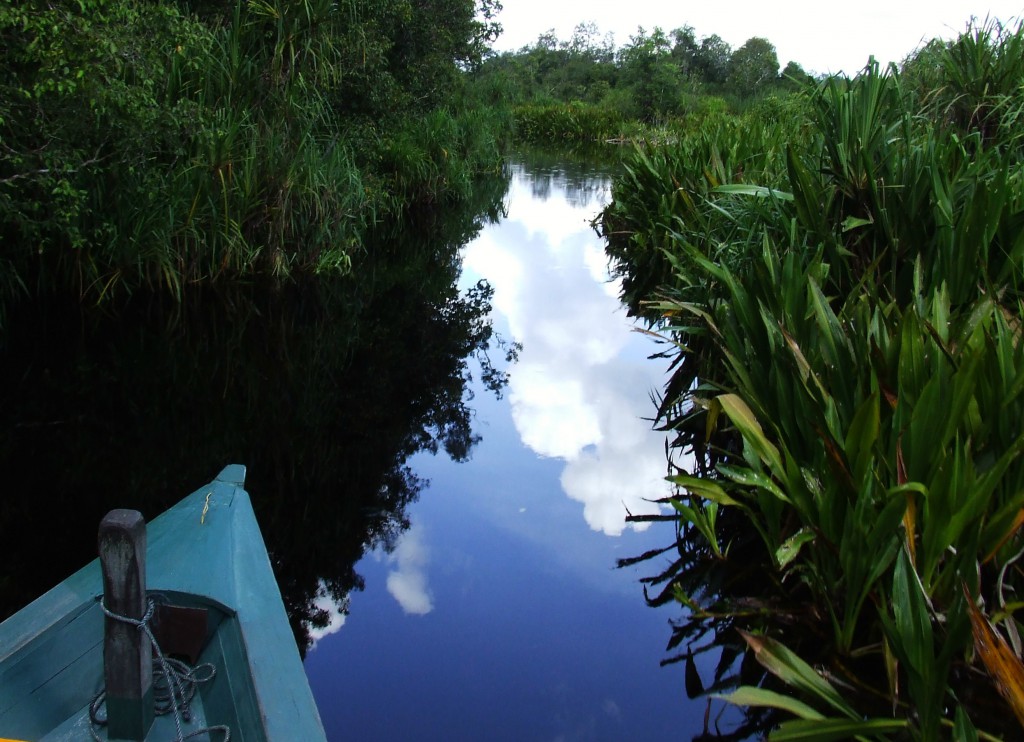
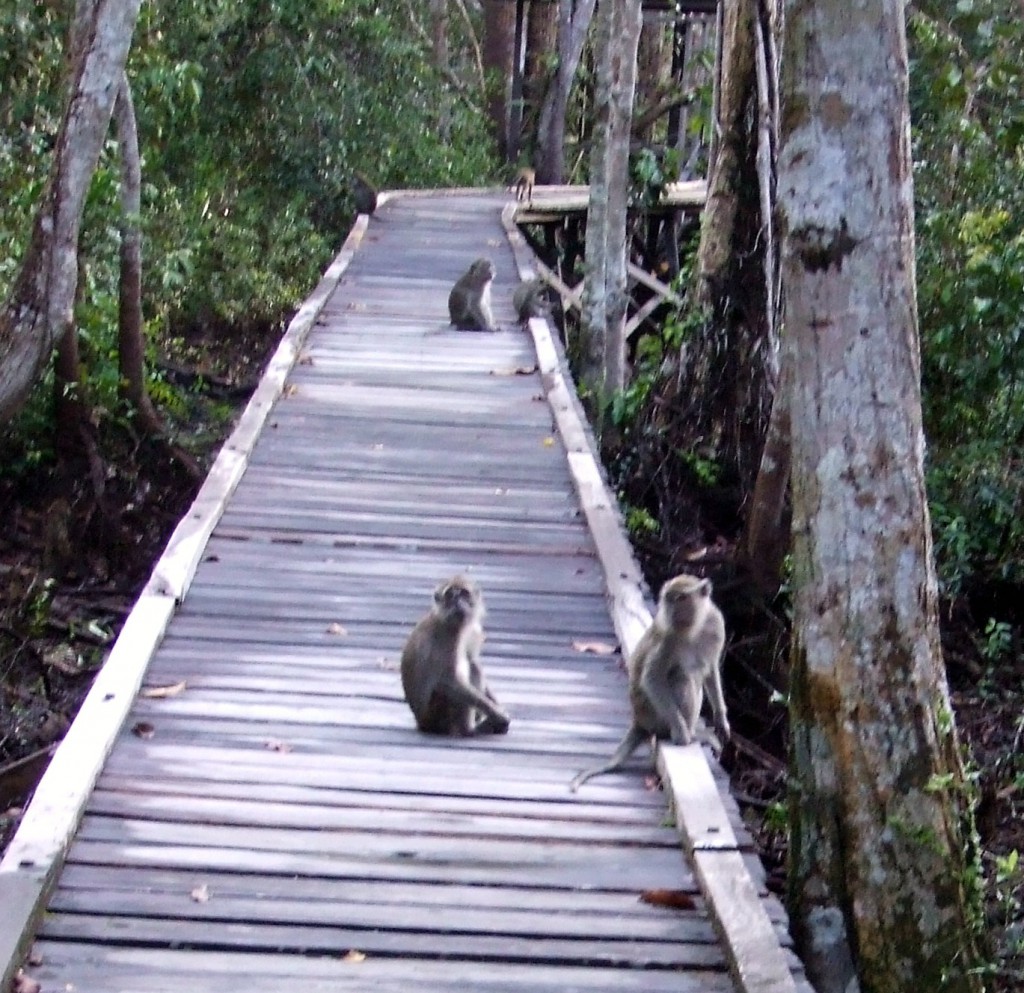
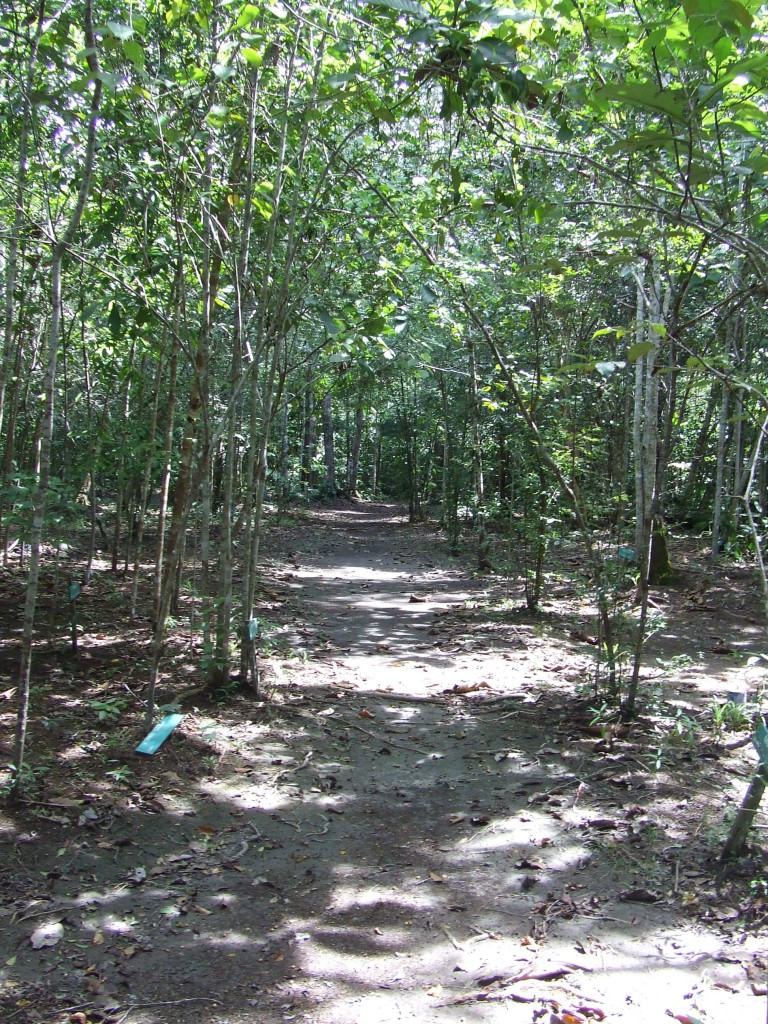
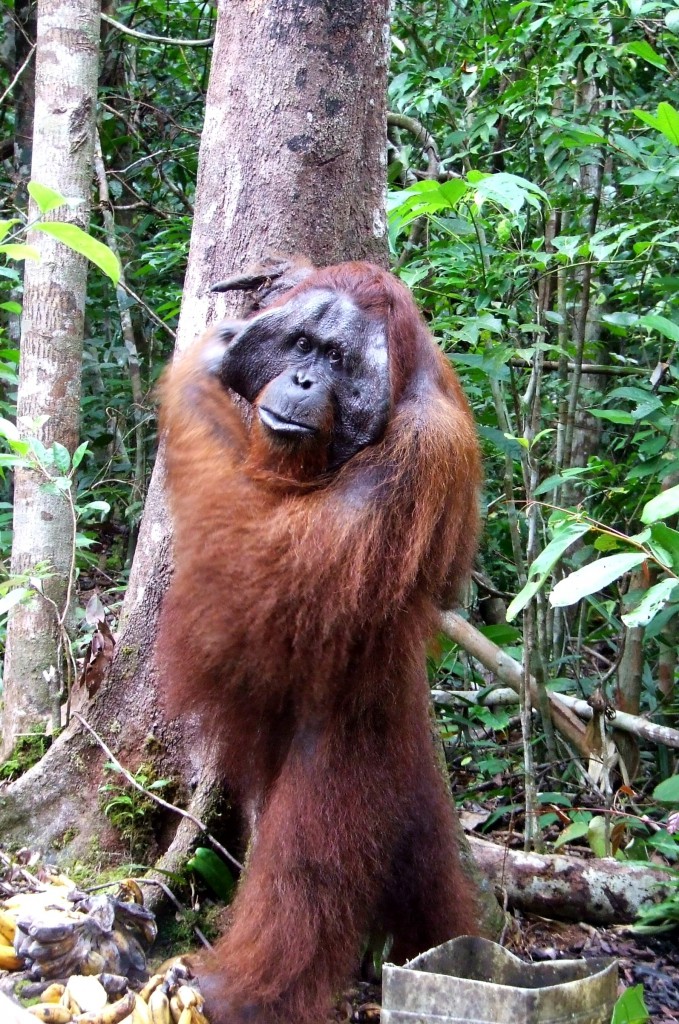
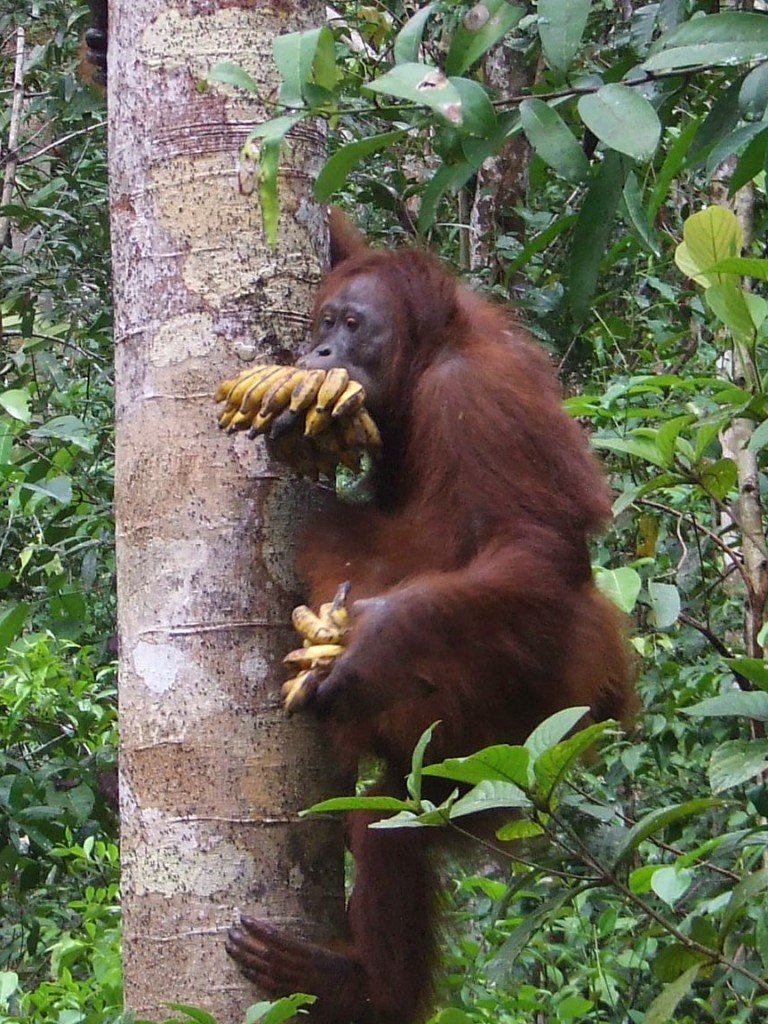
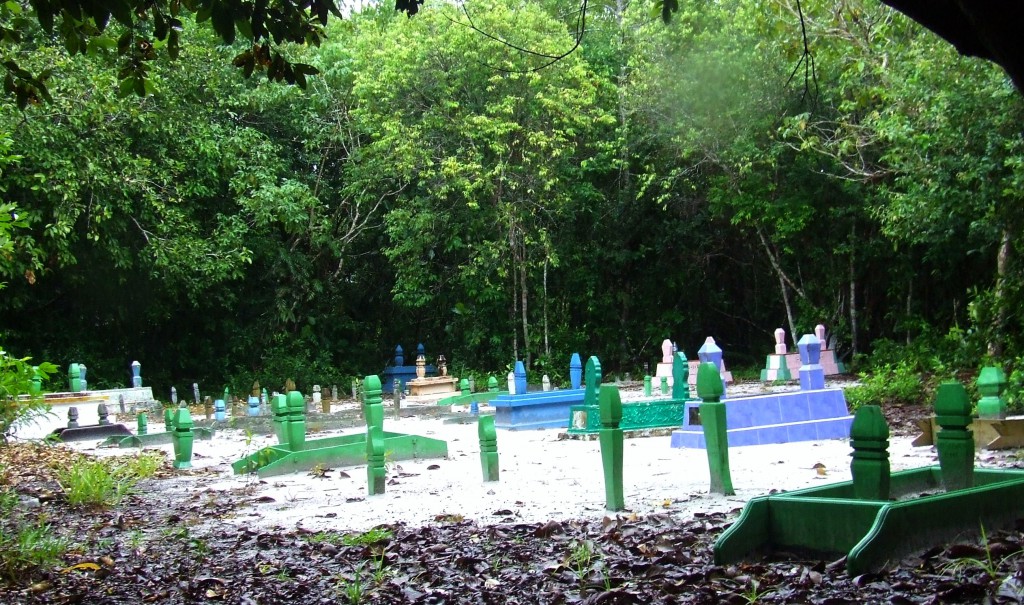















{ 2 comments… read them below or add one }
You have such a gift with words describing this stunning experience.
You have such a gift: reading this I almost feel the heat, can nearly smell the rich earth and tree smell of the jungle. I’m glad you planted trees, I’m glad it felt cathartic.
Thanks so much for sharing this with us, I cannot wait to hear more.
Whoa, Molly recently posted…Connection: My Uninterrupted Net Presence & Why I’m Always Online